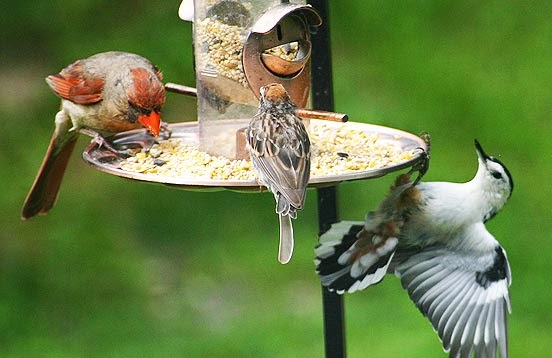Feed the Birds Year Round, Not Just in Winter
If you think that
birds only need to be fed in the winter, then you are part of the
majority of people who think so. Unfortunately, that is just not the
case. While birds certainly do benefit from feeding during the winter
when natural sources of food can be scarce, they can benefit from
human-supplied food nearly year round.
 |
| Hungry Birds at the Bird Feeder Eating Sunflower Seeds |
There are various
reasons for this. In the early springtime, for example, migratory
birds have just returned from their long flights, and they are hungry
and in need of good nourishment. At that time of the year, the trees
are bare and the grasses have not begun to grow. So, until the
spring foliage is fully developed, there is a limited supply of food,
and there is fierce competition for what little food that exists at
that time of the year. The early springtime is also the time of the
year when birds build nests. These nest building activities put
extra stress on birds' bodies, and so the birds can benefit from
extra sources of human-supplied food. In fact, many experts advise
that you leave your bird feeders up until after the time that the
leaves on the trees are fully grown in and developed.
 |
| Birds Feeding in the Springtime |
After spring comes
summer. During this season, hummingbirds and orioles appreciate
nectar feeders. Hummingbirds need lots of carbohydrates to thrive.
As summer comes to a close, the migratory birds need to fatten
themselves up in order to survive their long flights to warmer
climates. Finally, in the fall and winter, the non-migratory birds
need to be fed. This is especially true if there is snow and ice
covering the ground, which covers up the natural food supplies.
 |
| Bird Eating from a Sunflower |
As for the question
of what to feed birds, they thrive on diets that are different than
ours. They need to eat high amounts of fat and protein. In fact, if
you put out nothing else, feed the birds black oil sunflower seeds.
These are an excellent choice because they are economical and provide
excellent nutrition. Because they appeal to the widest variety of
birds, there will be no waste. You should be cautious of commercial
mixes, because they are often full of unpopular seeds. These are a
waste because the birds will not eat them, and you will have paid
money for seeds that will be left at your feeder and on the ground
where they will attract squirrels and other less desirable rodents.
Some examples on undesirable seeds are flax, golden millet,
buckwheat, red millet, and rapeseed. In addition, to these, canary
food, wheat, and oats are only consumed by nuisance birds. Read the
ingredients on any bag of commercial mix that you are considering.
If you see any of these seeds, then steer clear.
No comments:
Post a Comment